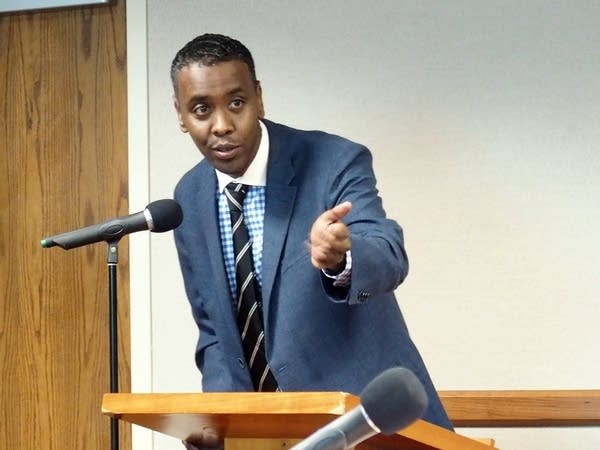Minneapolis panel greenlights filming of controversial HBO drama

Go Deeper.
Create an account or log in to save stories.
Like this?
Thanks for liking this story! We have added it to a list of your favorite stories.
The forces of commerce, ethnic culture and politics collided in the cramped meeting room of the Minneapolis Public Housing Authority on Tuesday when a capacity crowd heard arguments over whether to allow three days of filming around MPHA properties in Cedar Riverside for the controversial HBO drama "Mogadishu, Minnesota."
Ultimately, the housing authority gave conditional approval for HBO to shoot around its properties. Filming is slated to begin in mid-October.
However, opponents of the show worry it will cast a bad light on the Twin Cities' Somali-American community.
For its part, HBO says "Mogadishu, Minnesota" will be a financial boost for the area while portraying lives of local Somali-Americans.
Turn Up Your Support
MPR News helps you turn down the noise and build shared understanding. Turn up your support for this public resource and keep trusted journalism accessible to all.
"It's a family drama that explores what it means to be an American through the eyes of the Somalis of Minneapolis," said HBO producer Jonathan Filley, who pitched the show. "There's been some unauthorized press which came out about a year ago, when this show was earlier referred to as 'The Recruiters,' and it was said to be about terrorist recruiting. This is not what this show is about. This story is about the Somali-American experience."
The show is being created by the Canadian-Somali musician K'naan, who's widely respected for his work promoting Somali issues. He was surprised when protesters cut short a recent performance he attempted in Cedar Riverside.

People in the crowd were upset by what they'd heard about "Mogadishu, Minnesota." One protester was arrested after police moved in.
Student Ian Dahir told housing authority board members the community is still opposed to the show.
"Depicting Cedar Riverside as a hotbed of U.S. Jihadi recruitment poses a threat to MPHA residents and the broader Cedar Riverside community," she said. "To dismiss these concerns in lieu of short-term jobs and unsubstantiated benefits would be short sighted and irresponsible."
Dahir also noted the show's executive producer Kathryn Bigelow, who made "The Hurt Locker" and "Zero Dark Thirty."
"Kathryn Bigelow is infamous for directing movies depicting Muslims as violent extremists," she said.
When asked about Bigelow, HBO's Filley said Bigelow is listed as executive producer because she helped K'naan set up the project.
Bigelow is no longer with the series, Filley said.
The "Mogadishu, Minnesota" project is clearly a conundrum for local officials.
Sixth Ward Minneapolis City Council Member Abdi Warsame was the first Somali American in the US elected to a municipal council, and he told the public housing commissioners that he's critical of negative portrayals.
"I'm a member of the community. I live in Cedar Riverside. I raise my children in Cedar Riverside, intentionally," he said. "And I don't want anyone to make my community look bad. We are not recruiters. We are not terrorists. We shouldn't be targeted. We shouldn't be stigmatized. We shouldn't be isolated."
However, that doesn't mean Somalis should not be part of the cultural narrative, Warsame said. He said he had been in discussion with K'naan and saw a treatment of the story he wants to tell.
Warsame said he had confidence in K'naan's intentions, adding that the community shouldn't ignore the possible benefits the show might bring.

"It's a big production. It can create a lot of jobs and give opportunity to young individuals in my community," Warsame said. "I think it is something we should welcome."
HBO says the pilot now underway will cost about $5.5 million — much of which will be spent in Minneapolis. If the series goes ahead, it would cost between $4 and $5 million per show for a 10-episode season, with the possibility open for more seasons.
For the three days of shooting alone, Filley estimate they'll need around 100 extras from the community. He also said HBO is using the production to attach local people to the craft side of the film business, doing lighting costumes and other behind the scenes work — which can become union-scale careers.
The MPHA commissioners said they had to weigh the possible gains against disturbing and upsetting tenants. Board chair Clayton Tyler said Mayor Betsy Hodges was in favor of going ahead too.
The board's unanimous vote to conditionally allow filming came with two provisos: First, the local resident council had to give its permission; and second, the location fees earned must be used to benefit residents.
Correction (Sept. 29, 2016): An earlier version of this story used an incorrect first name for Clayton Tyler.


